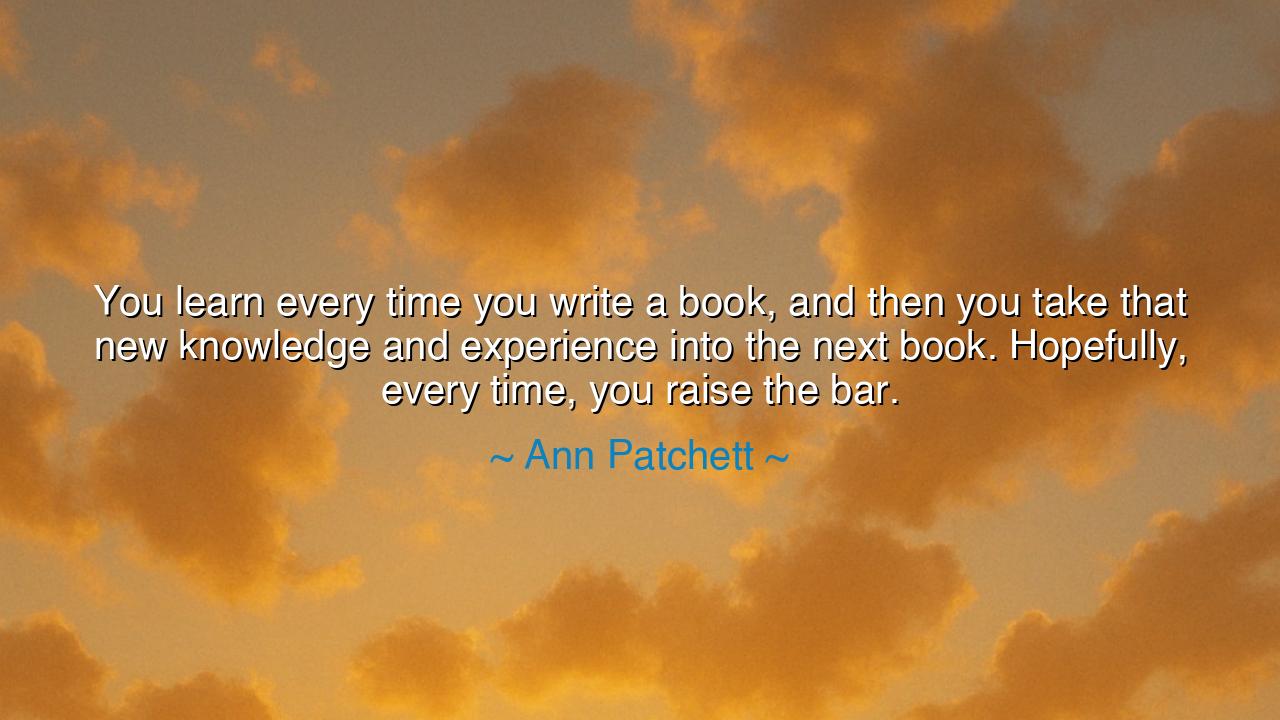
You learn every time you write a book, and then you take that new
You learn every time you write a book, and then you take that new knowledge and experience into the next book. Hopefully, every time, you raise the bar.






The words of Ann Patchett — “You learn every time you write a book, and then you take that new knowledge and experience into the next book. Hopefully, every time, you raise the bar” — are not merely a reflection on writing, but a hymn to the nature of growth, mastery, and renewal. Within these words lies a truth known to all who create: that every act of creation is both an arrival and a beginning. To learn, to struggle, to shape words or deeds — this is the sacred rhythm of progress. Each work we make becomes a teacher, and each teacher prepares us for the next mountain to climb.
In the style of the ancients, we might say: “The craftsman becomes his own apprentice with every dawn.” Patchett’s wisdom reminds us that knowledge is not static but living, and that mastery is not achieved once but earned again and again. The writer who believes she has learned all there is to know has already begun to wither; the one who sees each page as a lesson is reborn with every line. In this, Patchett speaks the universal law of artistry: creation refines the creator. The brush teaches the painter, the chisel instructs the sculptor, the blank page humbles the writer. Thus, the soul of the artist is in perpetual apprenticeship to her own unfolding.
The origin of this quote can be traced to Patchett’s reflections on her own literary journey — from Bel Canto to The Dutch House and beyond. Her career, marked by both discipline and grace, stands as testimony to this truth. She has often spoken of how each novel revealed its own unique difficulties and insights, shaping her as both writer and person. Her words are not boastful but reverent: each book is a new teacher, each failure a hidden tutor. The raising of the bar, then, is not a matter of ambition alone, but of integrity — the inward vow to grow deeper in truth, to create not for fame, but for the honest pursuit of excellence.
History gives us countless echoes of this principle. Consider Michelangelo, who, even after painting the Sistine Chapel, once said, “Ancora imparo” — I am still learning. The master who carved David and built the dome of St. Peter’s Basilica knew that creation is never finished; it is a dialogue between the human hand and the infinite. So too with Patchett’s insight: each creation carries within it both the culmination of what has been learned and the seed of what must still be discovered. The artist, the thinker, the leader — all must live within this sacred tension between mastery and humility.
Patchett’s words also reveal a quiet kind of courage — the courage to begin again. To raise the bar is to risk failure. It means leaving behind what is safe, stretching toward what is uncertain. Many who create, whether in art or life, fear this challenge; they cling to what has already worked. But Patchett’s wisdom calls us to higher ground: to take what we have learned not as a shield, but as a foundation. The writer who dares to grow accepts that she will stumble, that each new work will humble her. Yet from that humility springs a greater power — the power to evolve.
This truth extends beyond the realm of art. In every craft, every vocation, every life devoted to growth, we face the same choice: to repeat what we know, or to strive toward what we might become. The teacher improves her lesson with each year; the healer deepens her empathy with each patient; the leader learns from every mistake and becomes wiser in service. Each time we learn, we are given the opportunity — and the responsibility — to raise the bar for ourselves and for those who follow.
Let this, then, be the lesson for all who walk the path of creation and self-mastery: never cease to learn from your own labor. Do not measure success by applause or achievement, but by the refinement of your craft and the deepening of your understanding. Every effort, every failure, every triumph becomes a stone in the staircase that leads upward. As Patchett teaches, we must climb not toward perfection, but toward growth — for that is the true artist’s pilgrimage.
And so, to all who seek meaning in their work, remember: each creation is both an ending and a beginning. Learn from what you have done; let it humble you, guide you, and push you higher. Raise the bar — not for glory, but for truth. For the one who never stops learning, who builds upon each act of creation with reverence and courage, touches something eternal — the ever-living flame of human progress, the sacred art of becoming.






AAdministratorAdministrator
Welcome, honored guests. Please leave a comment, we will respond soon